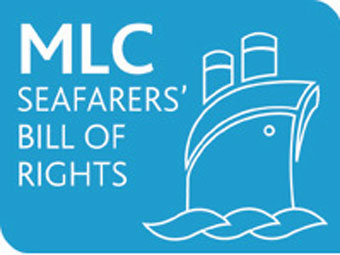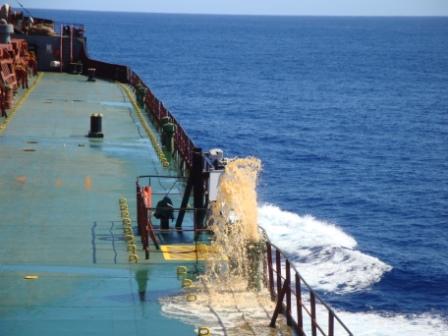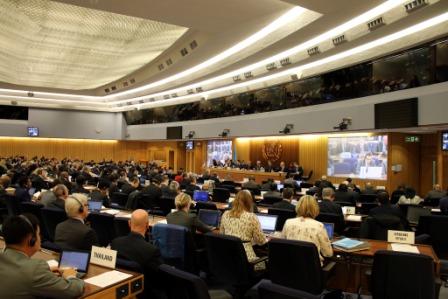MLC or Maritime Labour Convention is a much-talked convention and is first of its kind which is basically for protecting the rights of seafarers all around the world.
Let’s be informed of what is MLC and what are our rights under MLC.
WHAT IS MLC?
- The Maritime Labour Convention 2006 (‘MLC’) is an international agreement of the International Labour Organisation (‘ILO’) which sets out seafarers’ rights to decent conditions of work. It is also called the seafarers’ Bill of Rights.
- The MLC was adopted in February 2006 and entered into force on 20 August 2013.
- The MLC does not deal with seafarers’ identity documents (ILO C108 and C185) or with pensions (ILO C71).
- The MLC contains minimum standards only, and seafarers may have better standards under relevant national laws, or under their employment agreements or collective agreements.
WHEN DOES THE MLC APPLY?
- The Maritime Labour Convention 2006 (‘MLC’) applies to seafarers working on a ship of a country that has ratified the MLC.
- The MLC also seeks to protect seafarers operating under the flag of a country that has not ratified the MLC. This is the concept of the ‘no more favorable treatment clause’ which means that ships under the flag of a country that has not ratified the MLC will be inspected in the port of a ratifying country.
- The MLC applies to all ships, whether publicly or privately owned, which are ordinarily engaged in commercial activity.
- The MLC does not apply to ships navigating only in inland or sheltered waters, or areas where port regulations apply.
- The MLC also does not apply to ships engaged in fishing, or ships of traditional build such as dhows or junks; or to warships or naval auxiliaries.
FUNDAMENTAL RIGHTS
- To associate and to bargain collectively. This is the right to join a trade union of choice and to bargain collectively.
- Freedom from forced labour. This is the right not to be treated like a slave.
- Not to be subjected to child labour.
- The elimination of discrimination in respect of employment and occupation.
The MLC deals with related rights such as a seafarer’s right to an employment agreement, wages and regulated hours. These and other related matters are subject to routine inspection and certification.
MINIMUM AGE REQUIREMENTS
- A person must be 16 years old or above to work as a seafarer.
- A seafarer who is between 16 and 18 years of age can work on a ship but cannot do:
- night work (with some possible exceptions); or
- work that puts the seafarer’s health or safety at risk.
- ‘Night’ is determined in accordance with national law and practice. It must cover a period of at least nine hours starting no later than midnight, and ending no earlier than 5 am.
MEDICAL REQUIREMENTS
- A seafarer cannot work on a ship unless he holds a valid medical certificate stating that he is medically fit to perform the duties he is to carry out at sea.
- A country that has ratified the MLC must set out the medical examination and certificate that is needed. The certificate must:
- be in English if the ship does international voyages;
- be issued by a duly qualified medical practitioner. (Each country will decide who is qualified for this purpose, but practitioners must have professional independence); and
- be valid.
- Unless a shorter period is required, the maximum period of validity for a certificate is:
- two years – except for seafarers under 18: then it is one year
- six years for a colour vision certificate.
- If a certificate is refused, or limited, a seafarer can have a further examination by another independent medical practitioner, or by an independent medical referee.
- There is a procedure for urgent cases which allows the seafarer to carry on working for a short time with an expired medical certificate.
RIGHT TO FAIR RECRUITMENT AND PLACEMENT
Under the Maritime Labour Convention 2006 (’MLC’) private seafarer recruitment and placement agencies must:
- not operate any form of blacklists or other means to prevent seafarers from getting employment for which they are qualified;
- not impose any fees or other charges to the seafarer, except the cost of a medical certificate, the national seafarer’s book, and a passport or other personal travel document and the cost of visas shall be borne by the shipowner;
- keep an up-to-date register of all seafarers recruited or placed through them;
- ensure that seafarers are informed of their rights and duties under their employment agreements prior to being engaged and that they can examine their employment agreements before and after they are signed, and that they receive a copy;
- verify that the seafarers are qualified;
- verify as far as practicable that the shipowner has the means to protect seafarers from being stranded in a foreign port;
- respond to any complaint concerning their activities; and
- establish a system of insurance or equivalent measure to compensate seafarers for any breach of obligation by the recruitment agency or the shipowner.
RIGHT TO BE PAID WAGES
- A seafarer does not have a minimum wage. However, a country that has ratified the MLC is encouraged to consult shipowner and seafarer organizations and to establish procedures for determining minimum wages for seafarers.
- It is also recommended that the basic pay or wages for a calendar month for an able seafarer should be no less than the amount set from time to time by the Joint Maritime Commission or another body authorised by the International Labour Organization.
- The current minimum monthly basic wage figure for able seafarers is:
From 1 January 2014: USD585
From 1 January 2015: USD592
From 1 January 2016: USD614
- A seafarer has the right to be paid for his work regularly and in full accordance with his employment agreement.
- A seafarer has the right to be paid at least monthly, and in accordance with any applicable collective agreement.
- Seafarers must be given a monthly account of the payments due and amounts paid, including wages, additional payments, the rate of exchange and any authorized deductions (such as allotments).
- Seafarers must be provided with a means to transmit all or part of their earnings to their families or dependants or legal beneficiaries. Any charge for such service must be reasonable in amount and the exchange rate must not be unfavorable.
RIGHT TO REGULATED HOURS OF WORK AND REST
A seafarer has the right to regulated hours of work and hours of rest.
Hours of work are stated as either maximum hours of work, or minimum hours of rest:
- the maximum hours of work must not exceed 14 hours in any 24-hour period and 72 hours in any seven-day period; or
- the minimum hours of rest must not be less than 10 hours in any 24-hour period, and 77 hours in any seven-day period.
- Hours of rest means time spent outside of work on account of the ship. It does not include short breaks.
- Hours of rest may be divided into two periods, one of which must be at least 6 hours. The interval between periods of rest must not be longer than 14 hours.
- Account must be taken of the danger posed by the fatigue of seafarers.
- Any mandatory musters or drills must be conducted in a way that minimizes disturbances of rest hours and does not induce fatigue.
- A schedule/table of service at sea and service at the port for all positions must be posted on the ship. It must be in the working language of the ship and in English.
- A record of a seafarer’s daily hours of rest or hours of work must be kept on board in the working language of the ship and in English, and must be signed by the seafarer and the master or other authorized person. The seafarer must be given a copy.
- In the event of an emergency or to give assistance to other ships or persons in distress at sea, the master can suspend the work schedule until the problem is resolved. If normal working hours are disrupted, a seafarer is entitled to an adequate compensatory rest period.
RIGHT TO BE REPATRIATED
- A seafarer has the right to be repatriated at no cost to him in the following circumstances:
- if the seafarer’s employment agreement expires while he is abroad;
- when the seafarer’s employment agreement is terminated by the shipowner; or by the seafarer for justified reasons; and
- when the seafarer is no longer able to carry out his duties under his employment agreement, or cannot be expected to carry them out in the circumstances.
- Ships must provide financial security to ensure that seafarers are duly repatriated.
- A seafarer cannot be asked to make an advance payment towards the cost of repatriation. The cost of repatriation cannot be deducted from the seafarer’s wages or other entitlements unless the seafarer is in serious default of his obligations.
- The right to repatriation should include transport to the place where a seafarer signed his employment agreement, his country of residence, place stipulated by a collective agreement, or such other place as mutually agreed with the shipowner.
- The shipowner should pay for the following:
- the seafarer’s passage to the place of repatriation, usually by air;
- accommodation and food for the duration of the journey;
- pay and allowances for the duration of the journey if specified by national law or by the collective bargaining agreement;
- transportation of 30 kg of luggage; and
- medical treatment where necessary to make the seafarer fit for travel.
RIGHT TO DECENT ACCOMMODATION AND RECREATIONAL FACILITIES ON BOARD
- A seafarer has the right to safe and decent accommodation and recreational facilities.
- The MLC sets out detailed and technical requirements concerning matter such as: the size of rooms and other accommodation spaces; heating and ventilation; noise and vibration and other ambient factors; sanitary facilities; lighting; and hospital accommodation.
- A country that has ratified the MLC must inspect ships registered under its flag when the ship is registered or re-registered, or if the seafarer accommodation has been substantially altered, to ensure that seafarers’ accommodation is in accordance with the MLC.
- Frequent inspections of accommodation areas must be carried out by or under the authority of the master and recorded to ensure that the seafarer accommodation is clean, habitable and maintained in a good state of repair. The records must be available for inspections.
RIGHT TO GOOD QUALITY FOOD AND DRINKING WATER
- A seafarer has the right to good quality food and drinking water provided under regulated hygienic conditions.
- Food and drinking water must be of appropriate quality, nutritional value and quantity, taking into account the requirements of the ship and the differing cultural and religious backgrounds of seafarers on the ship.
- Food must be free of charge.
- Full-time and fully qualified cooks are not always required. The size of the ship and the number of daily meals required are factors that will decide this.
- Seafarers employed as ships’ cooks with responsibility for preparing food must be trained and qualified for their positions.
- Seafarers working as ships’ cooks must not be less than 18 years old.
- Frequent and documented inspections of food and water supplies and catering facilities must be carried out by the master or a designate.
RIGHT TO ACCESS SHORE BASED WELFARE FACILITIES
- A country that has ratified the MLC must promote the development of welfare facilities in designated ports to provide seafarers on ships that are in port with access to adequate welfare facilities and services.
- There should be consultation with shipowner and seafarer organisations concerning which ports are to be regarded as appropriate.
- Shore based welfare facilities, where they exist, must be easily accessible.
- Shore based welfare facilities, where they exist, must be available for the use of all seafarers irrespective of nationality, race, colour, sex, religion, political opinion or social origin.
- Welfare Boards are encouraged so as to make sure that adequate services are provided.
RIGHT TO COMPLAIN ON BOARD
- A seafarer has the right to an on board complaints procedure to complain about breaches of their rights under the MLC.
- On board complaint procedures must aim to resolve complaints at the lowest level possible, but seafarers must be able to directly complain to the master, the shipowner and, if necessary, to appropriate external authorities.
- Under the on board complaints procedure seafarers have the right:
- to be accompanied or represented during the complaints procedure;
- not to be victimized for filing a complaint;
- to confidentiality throughout the process; and
- to seek redress for a complaint using whatever legal means the seafarer considers appropriate.
- Seafarers must receive a copy of the on board complaint procedures applicable on their ship.
- There should be a person on board the ship who has been nominated to advise seafarers on the procedures available to them.
- A complaint should as a minimum:
- be addressed to the head of the department or to the seafarer’s superior officer; and
- include personal details, ship details, details regarding the complaint, witnesses and any supporting documentation
- If the addressee cannot resolve the matter, the complaint should be referred to the master or ashore.
- The complaint must be recorded and a written copy provided to the seafarer at every stage of the process.
Hope this information will be useful for you. Do let us know your views in the comments section. We will love to hear from you.
Source: www.ilo.org




